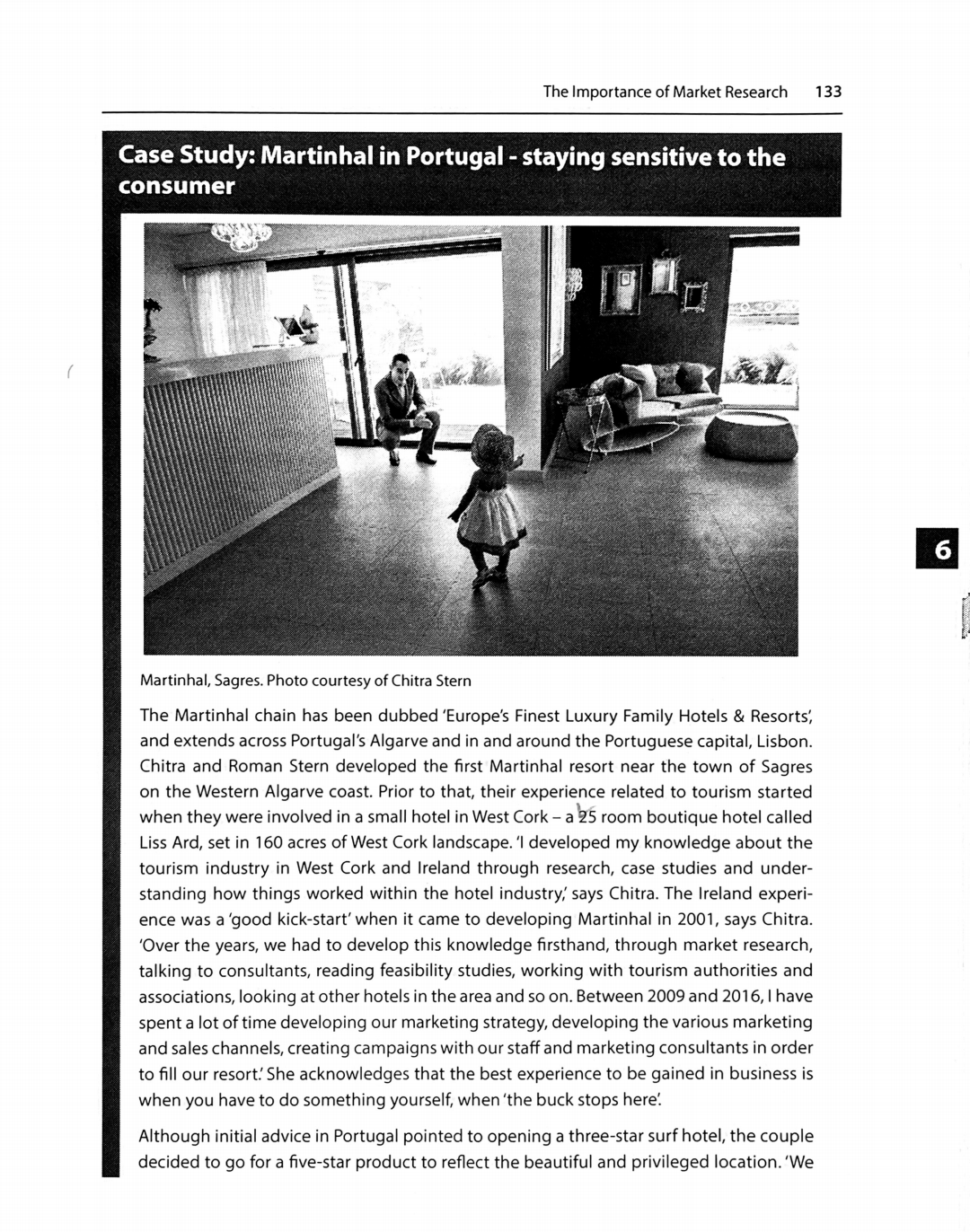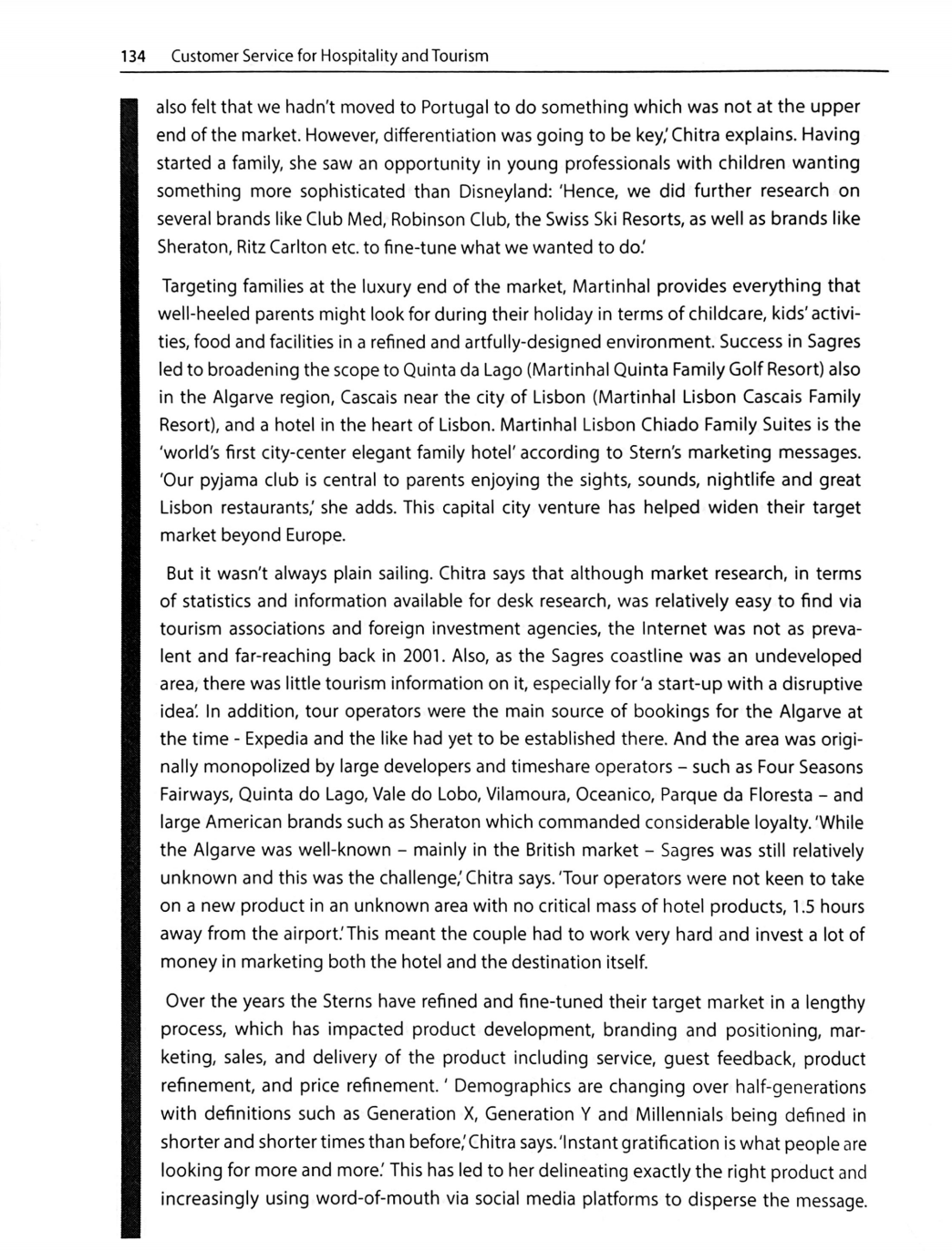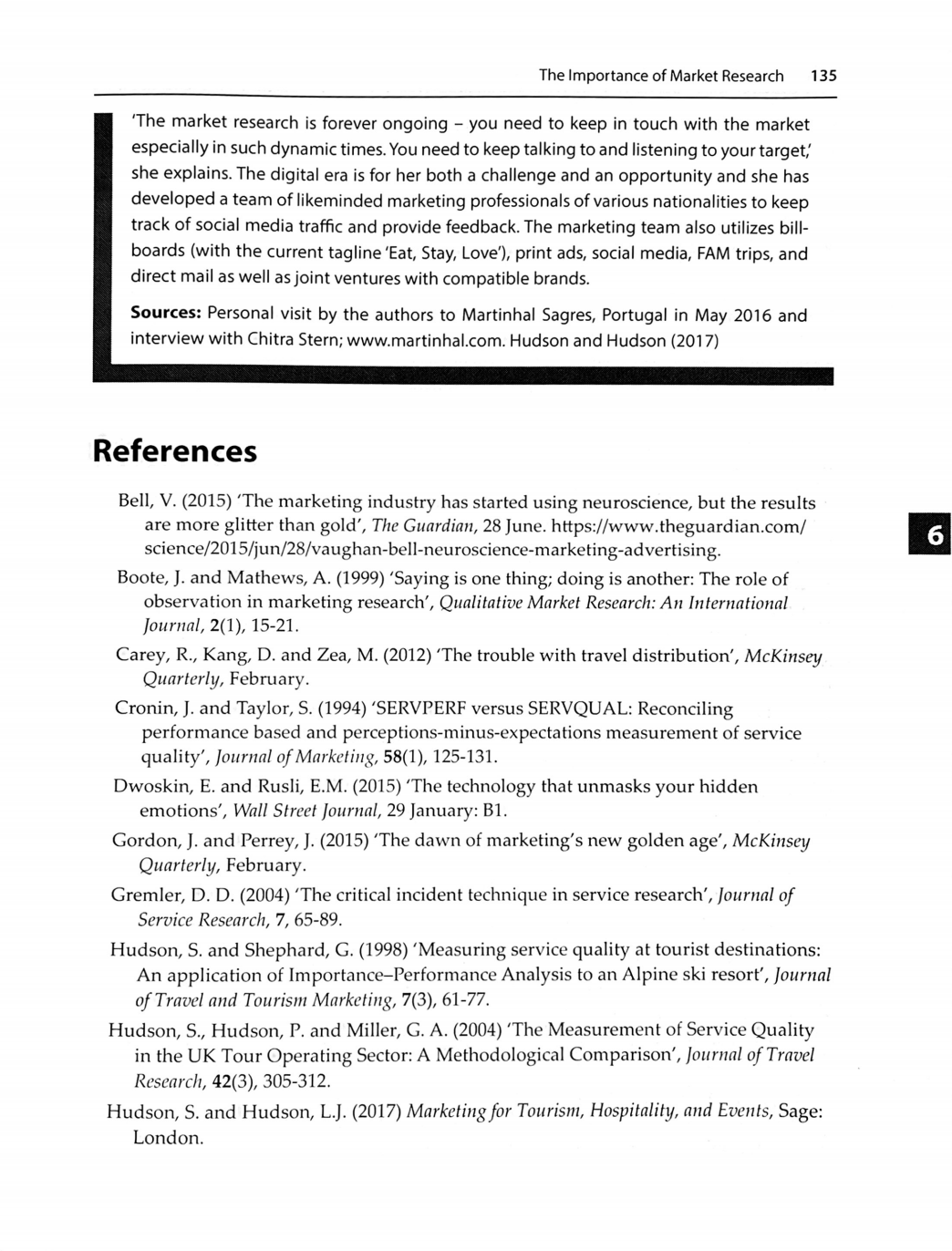Chapter 6 Martinhal in Portugal-staying sensitive to the consumer (p. 133)
Here are my questions for all case studies:
1. What were the issues?
2. How could these issues have been avoided?
The Importance of Market Research 133 Case Study: Martinhal in Portugal - staying sensitive to the consumer O 6 Martinhal, Sagres. Photo courtesy of Chitra Stern The Martinhal chain has been dubbed 'Europe's Finest Luxury Family Hotels & Resorts', and extends across Portugal's Algarve and in and around the Portuguese capital, Lisbon. Chitra and Roman Stern developed the first Martinhal resort near the town of Sagres on the Western Algarve coast. Prior to that, their experience related to tourism started when they were involved in a small hotel in West Cork - a 25 room boutique hotel called Liss Ard, set in 160 acres of West Cork landscape. 'I developed my knowledge about the tourism industry in West Cork and Ireland through research, case studies and under- standing how things worked within the hotel industry, says Chitra. The Ireland experi- ence was a 'good kick-start' when it came to developing Martinhal in 2001, says Chitra. 'Over the years, we had to develop this knowledge firsthand, through market research, talking to consultants, reading feasibility studies, working with tourism authorities and associations, looking at other hotels in the area and so on. Between 2009 and 2016, I have spent a lot of time developing our marketing strategy, developing the various marketing and sales channels, creating campaigns with our staff and marketing consultants in order to fill our resort.' She acknowledges that the best experience to be gained in business is when you have to do something yourself, when 'the buck stops here' Although initial advice in Portugal pointed to opening a three-star surf hotel, the couple decided to go for a five-star product to reflect the beautiful and privileged location. 'We134 Customer Service for Hospitality and Tourism also felt that we hadn't moved to Portugal to do something which was not at the upper end of the market. However, differentiation was going to be key; Chitra explains. Having started a family, she saw an opportunity in young professionals with children wanting something more sophisticated than Disneyland: 'Hence, we did further research on several brands like Club Med, Robinson Club, the Swiss Ski Resorts, as well as brands like Sheraton, Ritz Carlton etc. to fine-tune what we wanted to do.' Targeting families at the luxury end of the market, Martinhal provides everything that well-heeled parents might look for during their holiday in terms of childcare, kids' activi- ties, food and facilities in a refined and artfully-designed environment. Success in Sagres led to broadening the scope to Quinta da Lago (Martinhal Quinta Family Golf Resort) also in the Algarve region, Cascais near the city of Lisbon (Martinhal Lisbon Cascais Family Resort), and a hotel in the heart of Lisbon. Martinhal Lisbon Chiado Family Suites is the 'world's first city-center elegant family hotel' according to Stern's marketing messages. 'Our pyjama club is central to parents enjoying the sights, sounds, nightlife and great Lisbon restaurants,' she adds. This capital city venture has helped widen their target market beyond Europe. But it wasn't always plain sailing. Chitra says that although market research, in terms of statistics and information available for desk research, was relatively easy to find via tourism associations and foreign investment agencies, the Internet was not as preva- lent and far-reaching back in 2001. Also, as the Sagres coastline was an undeveloped area, there was little tourism information on it, especially for 'a start-up with a disruptive idea' In addition, tour operators were the main source of bookings for the Algarve at the time - Expedia and the like had yet to be established there. And the area was origi- nally monopolized by large developers and timeshare operators - such as Four Seasons Fairways, Quinta do Lago, Vale do Lobo, Vilamoura, Oceanico, Parque da Floresta - and large American brands such as Sheraton which commanded considerable loyalty. 'While the Algarve was well-known - mainly in the British market - Sagres was still relatively unknown and this was the challenge,' Chitra says. 'Tour operators were not keen to take on a new product in an unknown area with no critical mass of hotel products, 1.5 hours away from the airport. This meant the couple had to work very hard and invest a lot of money in marketing both the hotel and the destination itself. Over the years the Sterns have refined and fine-tuned their target market in a lengthy process, which has impacted product development, branding and positioning, mar- keting, sales, and delivery of the product including service, guest feedback, product refinement, and price refinement. ' Demographics are changing over half-generations with definitions such as Generation X, Generation Y and Millennials being defined in shorter and shorter times than before, Chitra says. 'Instant gratification is what people are looking for more and more!' This has led to her delineating exactly the right product and increasingly using word-of-mouth via social media platforms to disperse the message.The Importance of Market Research 135 'The market research is forever ongoing - you need to keep in touch with the market especially in such dynamic times. You need to keep talking to and listening to your target, she explains. The digital era is for her both a challenge and an opportunity and she has developed a team of likeminded marketing professionals of various nationalities to keep track of social media traffic and provide feedback. The marketing team also utilizes bill- boards (with the current tagline 'Eat, Stay, Love'), print ads, social media, FAM trips, and direct mail as well as joint ventures with compatible brands. Sources: Personal visit by the authors to Martinhal Sagres, Portugal in May 2016 and interview with Chitra Stern; www.martinhal.com. Hudson and Hudson (2017) References Bell, V. (2015) 'The marketing industry has started using neuroscience, but the results are more glitter than gold', The Guardian, 28 June. https://www.theguardian.com/ 6 science/2015/jun/28/vaughan-bell-neuroscience-marketing-advertising. Boote, J. and Mathews, A. (1999) 'Saying is one thing; doing is another: The role of observation in marketing research', Qualitative Market Research: An International Journal, 2(1), 15-21. Carey, R., Kang, D. and Zea, M. (2012) 'The trouble with travel distribution', Mckinsey Quarterly, February. Cronin, J. and Taylor, S. (1994) 'SERVPERF versus SERVQUAL: Reconciling performance based and perceptions-minus-expectations measurement of service quality', Journal of Marketing, 58(1), 125-131. Dwoskin, E. and Rusli, E.M. (2015) 'The technology that unmasks your hidden emotions', Wall Street Journal, 29 January: B1. Gordon, J. and Perrey, J. (2015) 'The dawn of marketing's new golden age', Mckinsey Quarterly, February. Gremler, D. D. (2004) 'The critical incident technique in service research', Journal of Service Research, 7, 65-89. Hudson, S. and Shephard, G. (1998) 'Measuring service quality at tourist destinations: An application of Importance-Performance Analysis to an Alpine ski resort', Journal of Travel and Tourism Marketing, 7(3), 61-77. Hudson, S., Hudson, P. and Miller, G. A. (2004) 'The Measurement of Service Quality in the UK Tour Operating Sector: A Methodological Comparison', Journal of Travel Research, 42(3), 305-312. Hudson, S. and Hudson, L.J. (2017) Marketing for Tourism, Hospitality, and Events, Sage: London









